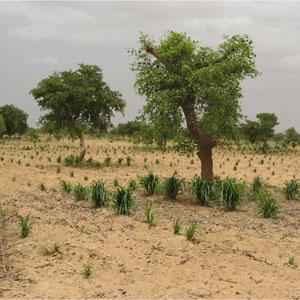
This is the VOA Special English Agriculture Report.
Niger is located in the Sahel desert south of the Sahara. The west African country is largely hot, dry desert. But since the 1980s Niger has gotten a lot greener.
Around the world, trees are often cut down to clear land for bigger farms or more homes for growing populations. But in Niger many farmers plant trees to protect their crops. They might cut some down, but often to sell the wood so they can buy food during a drought.
Over the years, an agricultural adviser named Tony Rinaudo has helped people in the Sahel learn about the value and care of trees. Mr. Rinaudo says government officials and nongovernmental organizations were not the ones who spread the idea.
TONY RINAUDO: "Much of the response has actually come from the farmers and the communities themselves, as opposed to NGOs and the government. Once the farmers have embraced and accepted this technology, they have practiced and they have shared it with their neighbors. And it has spread from farmer to farmer. So that has been very exciting."
Trees can provide a wind barrier. They improve the soil when their leaves fall. And they protect against soil erosion by holding moisture in the ground.
Niger often has severe dry periods. Researchers say villages where farmers planted trees did better than others during a drought and food shortage in 2005.
Mahamane Larwanou works for the group African Forest Forum. Mr. Larwanou says the villagers who had trees grew more food and could also eat fruit from fruit trees. And they could sell wood to buy food.
MAHAMANE LARWANOU: "The populations of those villages really survive better than those who do not have trees on their own farm because they can cut wood and take to the big city to sell and get some money to buy cereals. And, also, they use the leaves and the fruits of those tree species just to survive."
In the past, the French colonists who ruled Niger had a policy of government ownership of trees. Not surprisingly, this policy did nothing to make farmers want to take care of a valuable resource that was not their own.
In Burkina Faso, a farmer named Yacouba Sawadogo became internationally known for growing a forest. His neighbors resisted at first -- they even burned his land. But later they saw how trees could protect the soil against the spreading desert.
His story is documented in a film called "The Man Who Stopped the Desert." But Mr. Sawadogo says in much of Africa, "Nobody is looking after our forests."
And that's the VOA Special English Agriculture Report, written by Jerilyn Watson and Steve Baragona. For more gardening advice, and a link to captioned videos of our reports, go to voaspecialenglish.com. I'm Bob Doughty.
Dust from farming may affect rainfall
Bags help farmers protect harvests from air and insects
Growing trees in the desert, with the aid of a 'Waterboxx'
Community gardens grow green space in New York City
(来源:VOA 编辑:崔旭燕)
